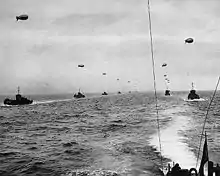Line of communication
A line of communication (or communications) is the route that connects an operating military unit with its supply base. Supplies and reinforcements are transported along the line of communication. Therefore, a secure and open line of communication is vital for any military force to continue to operate effectively. Prior to the advent of the use of telegraph and radio in warfare, lines of communication were also the routes used by despatch riders on horseback and runners to convey and deliver orders and battle updates to and from unit commanders and headquarters. Thus, a unit whose lines of communication were compromised was vulnerable to becoming isolated and defeated, as the means for requesting reinforcements and resupply is lost. The standard military abbreviation is LOC, or SLOC for Sea line of communication or ALOC for air line of communication.

The interdiction of supplies and reinforcements to units closer to the front lines is therefore an important strategic goal for opposing forces. Some notable examples:
- The Siege of Vicksburg in the American Civil War, in which Ulysses S. Grant encircled the city, leading to its eventual surrender in July 1863
- The Battle of France in World War II, in which the Germans cut off the French and British armies in Belgium (although the Dunkirk evacuation rescued over 330,000 of them)
- The encirclement of German 6th Army in the Battle of Stalingrad in World War II
- United States attacks on the Ho Chi Minh trail during the Vietnam War
See also
Logistics in general
Specific logistics operations
Notes
a line of communication can also refers to a civilian management (corporations lines of communication)
References
- The Oxford Essential Dictionary of the U.S. Military. Copyright © 2001, 2002 by Oxford University Press